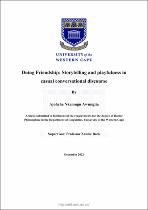Doing friendship: storytelling and playfulness in casual conversational discourse
Abstract
This study explores the linguistic construction of interpersonal relationships, specifically friendship. Although we have no control over which families we are born into, we can choose who can be our friend and unlike relationships formed within the workplace, there is no specific institutional context within which friendships can develop. There is also no legally binding agreement between friends as between married people, and there are no conventionalized roles that friends must play as is the case in parent-child relations. Nevertheless, friendship remains one of the most important relationships in people’s lives. Researchers have even argued that within a globalizing and increasingly mediatized world, friendships have gained more significance as more flexible and diverse ways of constructing one’s personal life become available (Spencer & Pahl 2006; Rawlins, 2017; Byron, 2021; Allan & Adams, 2007). This makes the study of the dynamics and processes of friendship within contemporary society fertile ground for harvesting insights into the ways in which the social fabric of the world is being (re)constituted.

